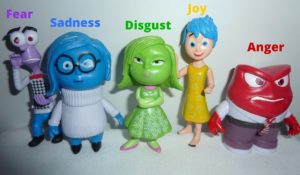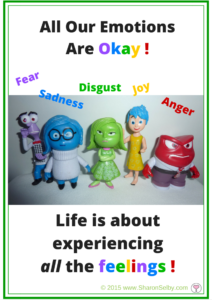The Importance of Accepting All Our Emotions
If you haven’t seen the movie Inside Out, I highly recommend it! This movie highlights the importance of accepting and being okay with all our emotions, including the distressing ones! We have come a long way with our emotions. Children are no longer “seen but not heard”. However, we still have room to grow… We now realize that it’s important to express our emotions and to help our children be more expressive, but our past childhood experiences can get in the way! (Inside today’s blog, I have a fun and colourful poster for you which you can print up as a reminder to the whole family that all our emotions are okay.)
Where are you on the scale of fully accepting all your child’s emotions?
Do you think that letting others know that you feel bad is a weakness?
Do you think it’s important for boys and girls to be able to have a big cry?
Do you think a bad attitude creates painful emotions?
Do you think that if your child is emotional that he/she is out of control?
Do you think it’s best to pay no attention or walk away when your child is expressing painful emotions?
If your child is scared to try something new, do you think he/she’s being a “baby” or a “sissy”?
Do you think your child should be able to control his/her emotions? (How many adults do you know who can “control” their emotions 100% of the time…and that is with a fully-developed brain!)
Do you think you should try to make your child happy when he/she is sad?
These are myths that are still prevalent. Our beliefs about our own emotions come from own childhood experiences.
When you were younger, were you “spanked” or beaten? If so, you might associate the sound of crying or painful emotions with these painful associations.
When you were younger, were you given a hug if you cried, and asked what was wrong, or were you told that this was not something to cry about, and if you didn’t stop crying, you’d soon be given something to cry about…
When you were younger, if you tried to express your opinion, were you sent to your room?
There are many adults, today, walking around with painful emotions that were not able to be expressed in their childhoods. These adults, then become parents, and there’s no bigger trigger than your own child experiencing an emotional melt-down.
How Do You Handle Your Child’s Melt-Downs?
I’ve written previous articles explaining what happens in our children’s brains and our own brains when we get emotionally charged, and so I won’t repeat this here, but I do want to re-emphasize that when the brain is taken over by emotion, it enters an instinctual state of fight, flight or freeze.
At that moment our children NEED US. Our children need a container to hold all of their emotions, and as their parents, we need to be that container. If we walk away, our children feel more scared and out-of-control, because if we can’t handle their emotions, then how are they supposed to?
On the other hand, if we are able to be the container, and reflect their feelings to them, offer them a hug, or stay near them until the big wave of emotion has passed, we are teaching them that all emotions are okay and we need all of our emotions in our life.
Accepting all of our child’s emotions is not the same as accepting all of their behaviour and this is where the confusion happens. As I often say, it’s important to remember… FEELINGS FIRST…LOGICS LAST! In the emotional moment, it’s important to focus on validating feelings thus bringing the emotional intensity down. Later, if relevant, one can focus on the logics of the behaviour.
What If My Child’s Big Emotions Are Triggering Me?
If your child’s emotional reaction is triggering you, try to re-frame your thoughts by saying things to yourself such as:
“My child is not yet 20+ years old, his/her brain is not fully developed, and he/she needs me to help contain these big emotions.”
“It’s okay for my child to have an emotional melt-down. I’m glad my child feels safe enough to let all these emotions out with me.”
“If I stay calm, and reflect, it will help my child feel less scared, and he/she will calm down quicker.”
“I am not re-living my childhood. It’s important for my child to be able to express him/herself and I can give him/her this gift.”
What Are The Consequences of Not Accepting All Emotions?
Dr. Marsha Linehan (founder of DBT) has discovered that emotionally vulnerable people, who have grown up in homes where their feelings were not validated nor accepted, will be more likely to have difficulties such as:
- Identifying and understanding their feelings
- Difficulty trusting their own emotional responses to situations
- Having coping skills for handling stressful situations and will therefore look to other people for advice (excessively)
- Holding emotions inside or being extremely emotional, in order to have their feelings recognized
Someone who is more biologically sensitive will be more reactive to low levels of stress and will take longer than average to return to baseline, once the stress has subsided. It’s important for us to know this about our children. If we have highly sensitive children, they are programmed to react more strongly and to take longer than others to calm down. This is their temperament…it is not their fault nor is it within their control!
It’s okay for children to experience distressing feelings, as this is how they learn to handle these big feelings. Being able to tolerate distressing feelings, is a key factor in being emotionally resilient.
I bought the toys (seen in this photo), representing the characters from Inside Out, for my play therapy office. Play therapy is a wonderful place for all emotions to be accepted and validated. To print this poster reminding us that all our emotions are okay and life is about experiencing all our feelings, please click here.
Thank you to a long-time reader of my blog, who wrote to me and asked me to cover this topic.
Have a wonderful week being the container for your child’s emotions,
Warmly,
PS. If you have friends and family who would benefit from this article, please share through email, Facebook, Twitter, Pintrest etc.
PPS. Registration is now open for my next round of “Brain Science” groups. These groups teach boys and girls (ages 7-9 yrs. and 10-12 yrs.) about anxiety and anxiety management strategies. The next groups will start in January 2016. You can register online here. *There are currently only 2 spaces left in the 7-9yrs. group.
PPPS. Like this article and poster? Please head on over to my Facebook page to continue the conversation 🙂
My 6 Top Apps for Creating More Calm for You and Your Children!
.
Want to Connect?
Subscribe now to receive free weekly parenting tips and inspiration.









